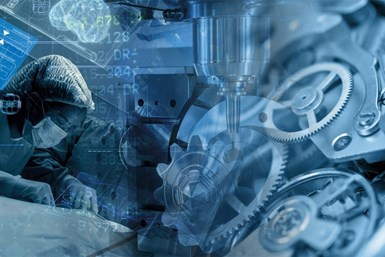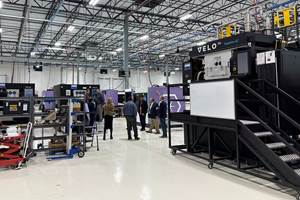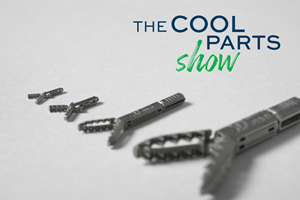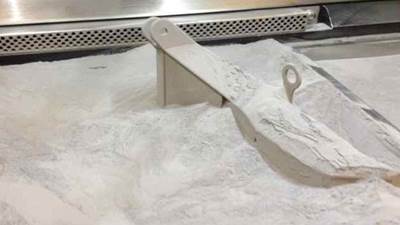Acrotec, AddUp Partner for the Future of the Medtech Sector
Acrotec and AddUp are combining expertise to enable the development of additive and industrial solutions dedicated to the medical sector, which is constantly evolving and looking for more innovative tools.
AddUp has worked in close collaboration with customers in the Medtech industry to develop and manufacture a wide variety of implants and instruments for surgeons and health professionals.
The partnership between Acrotec and AddUp plans to enable the development of additive and industrial solutions dedicated to the medical sector, which is constantly evolving and looking for more innovative tools. These high-precision tools meet strict manufacturing standards that AddUp’s customers, which have been active in the medical field for several years, have mastered.
“Players in the medical field have understood all the benefits of metal 3D printing and many implants or instruments are already manufactured using this technology,” says Julien Marcilly, AddUp deputy CEO. “As a supplier of metal 3D printers and parts, AddUp chose to partner with an experienced and recognized innovative partner, Acrotec. With Acrotec’s knowledge of the Medtech industry and expertise in precision machining and AddUp’s mastery of the metal 3D printing process, our partnership will offer the best solutions for customers in this demanding market.”
The Acrotec Group, through its Medtech division, is focused in the spine, traumatology and dental sectors. Acrotec Medtech produces implants and instruments to be used for surgical procedures. Over the years, the group has honed the necessary skills to manufacture precision components and subassemblies for medical devices, specifically in the machining and finishing of metal parts. This experience has made Acrotec Medtech a known industrial partner for the production of spinal and dental implants, as well as many instruments used in surgical procedures.
The use of additive manufacturing (AM) in the health care industry is increasing thanks to a reduction in cost when compared to traditional manufacturing and an improved design with options for personalization. AM technology also offers the opportunity to create personalized devices for patients to help transform health care as we know it today.
Among the materials available on its FormUp 350 machines, AddUp also offers recipes for shaping extra low interstitial (ELI) titanium. This grade of titanium is most commonly used by most manufacturers of surgical implants and prostheses. In addition to its biocompatibility, ELI titanium is nonmagnetic and has very high mechanical characteristics.
AM enables the creation and production of parts with complex and organic geometries, which would be impossible or very costly to produce using traditional CNC manufacturing technology. Production of these types of geometries using AM is also faster and more flexible, which provides an increase in productivity for medical device manufacturers.
“With AddUp as a partner, we are trying to push metal 3D printing technology to its limits in terms of part sizes and associated material health. The quality of AddUp’s printing systems as well as the expertise and motivation of the teams have allowed us to move forward in an open and efficient way in this initiative,” says François Billig, Acrotec Group CEO. “We are confident that through our partnership, Acrotec can now develop and utilize this technology with its customers in the Medtech sector.”
- Learn about AddUp’s partnership with Research Institute of Sweden (RISE) and the steps being taken to accelerate AM adoption in Sweden.
- Read about the opening of AddUp’s North American HQ which is a a proving ground for Metal AM, showcasing its laser powder bed fusion and directed energy deposition technologies.
Related Content
3D Printed PEEK Spine Implants in Production: The Cool Parts Show Bonus
Curiteva is using Fused Strand Deposition to produce two different lines of FDA-cleared spine implants. We visited the company’s Huntsville, Alabama, facility to learn more.
Read MoreZeda AM Production Plant in Ohio Now Open — Thoughts on the New Facility
73,000-square-foot metal powder bed fusion plant includes extensive machining capability plus separate operational models for serving medical versus other businesses.
Read More3D Printed Spine Implants Made From PEEK Now in Production
Medical device manufacturer Curiteva is producing two families of spinal implants using a proprietary process for 3D printing porous polyether ether ketone (PEEK).
Read MoreMicro Robot Gripper 3D Printed All at Once, No Assembly Required: The Cool Parts Show #59
Fine control over laser powder bed fusion achieves precise spacing between adjoining moving surfaces. The Cool Parts Show looks at micro 3D printing of metal for moving components made in one piece.
Read MoreRead Next
Postprocessing Steps and Costs for Metal 3D Printing
When your metal part is done 3D printing, you just pull it out of the machine and start using it, right? Not exactly.
Read MoreCrushable Lattices: The Lightweight Structures That Will Protect an Interplanetary Payload
NASA uses laser powder bed fusion plus chemical etching to create the lattice forms engineered to keep Mars rocks safe during a crash landing on Earth.
Read More3D Printed Polymer EOAT Increases Safety of Cobots
Contract manufacturer Anubis 3D applies polymer 3D printing processes to manufacture cobot tooling that is lightweight, smooth and safer for human interaction.
Read More




















